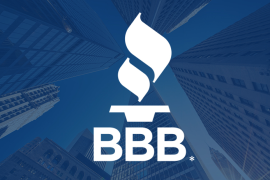With 2022 quickly winding down, Better Business Bureau has compiled our naughty list of the Top 12 Scams of Christmas. When shopping or donating this holiday season, watch out for schemes trying to swipe your cash or steal your personal information.
Recently, Better Business Bureau’s Vancouver location hosted an Instagram Live sharing the 12 Scams of Christmas with the public.
“With inflation still rampant, it seems as though holiday budgets have to be bigger than ever this year,” said Simone Lis, President and CEO of BBB serving Mainland BC.
“We highly suggest taking an extra second to research the company you’re buying from. Talk about your purchases with someone you trust. Is that genuinely a good deal or is it too good to be true? Don’t let a Grinch steal your holiday spirit or your hard-earned money.”
- Misleading social media ads.BBB Scam Tracker receives daily reports of people paying for items that they never receive, getting charged monthly for a free trial they never signed up for, or receiving an item that is counterfeit or much different from the one advertised. Always research before you buy.
- Social media gift exchanges.Each holiday season this scheme pops back up, and this year is no different. A newer version of this scam revolves around exchanging bottles of wine; another suggests purchasing $10 gifts online. In all of these versions, participants share their personal information and are further tricked into buying and shipping gifts or money to unknown individuals. And — it’s an illegal pyramid scheme.
- Holiday apps. There are dozens of holiday-themed cellphone and tablet apps where children can video chat live with Santa, light the menorah, or track Santa’s sleigh on Christmas Eve. Review privacy policies to see what information will be collected. Plus, keep an eye out for trial and hidden fees.
- Alerts about compromised accounts. Victims receive an email, call, or text message which explains that there has been suspicious activity on one of their accounts, whether it be on a streaming service or bank account – and it further urges them to take immediate action to prevent the account from being compromised.
- Gift cards. When buying gift cards at larger drug stores or department stores, make sure to double check the barcode on the back of the giftcard. A recent scam circulating around the country has a duplicated bar code sticker placed on top of the intended barcode, so that when customers complete their gift card purchase, they are actually loading a completely separate gift card unrelated to theirs. For example, the barcode for a $100 liquor store gift card would be placed on top of a barcode for a $100 retail store gift card instead. If you don’t catch the con during checkout, you end up activating their card instead of yours.
- Temporary holiday jobs. Retailers typically hire seasonal workers to help meet the demands of holiday shoppers. WIth Boxing Day coming down the line, shippers and delivery services are some of the top holiday employers this year, especially with the increase in online orders. In fact, 65% of job offer scams reported to BBB Scam Tracker were related to becoming a “warehouse redistribution coordinator” or some similar titles involving the reshipment of packages, which often contain stolen goods.
- Look-alike websites. The holiday season brings endless emails offering deals, sales, and bargains, but be wary of emails with links enclosed. Some may lead to look-alike websites created by scammers to trick people into downloading malware, making dead-end purchases, and sharing private information.
- Fake charities. The last few weeks of the year is a busy time for charitable donations. Donors are advised to look out for fraudulent charities and scammers pretending to be individuals in need. Avoid impromptu donation decisions to unfamiliar organizations. Always ask for credentials for charity representatives to prove that they are with the organization they claim to be representing.
- Fake shipping notifications. More consumers are making purchases online, and there is also an increase in the number of notifications about shipping details from retailers and carriers. Scammers are using this new surge to send phishing emails with links enclosed that may allow unwanted access to your private information or attempt to trick people into paying fake duty or other shipping fees.
- Pop up holiday events. If you are buying from a seasonal store, ask whether it will be open after the holiday and whether it will accept returns when the season is over. If not, consider buying elsewhere or taking more time to be sure the item is exactly what you want before making the purchase.
- Hot toy scams. Don’t be fooled by extra-low prices. Avoid making a purchase from a retailer you aren’t familiar with just because the price sounds too good to be true – it probably is! For example, a Vancouver man reported to BBB Scam Tracker that he lost $640 after sending an e-transfer to an unknown seller in Victoria for a Playstation 5. Once the transfer was completed, the seller disappeared, stopped replying back to messages, and the phone number was promptly disconnected.
- Puppy scams. Many families may be considering adding a furry friend to their household this year. Be sure to see the pet in person before making a purchase. While the number of cases are dropping, average monetary losses are climbing, with an average loss of $850 in 2022, up 60% since 2017. The Canadian Anti-Fraud Centre (CAFC) has logged 247 reports of pet scams in 2022 so far — a loss of about $217,453.
Learn how to avoid holiday-related scams by visiting BBB.org/Holiday




